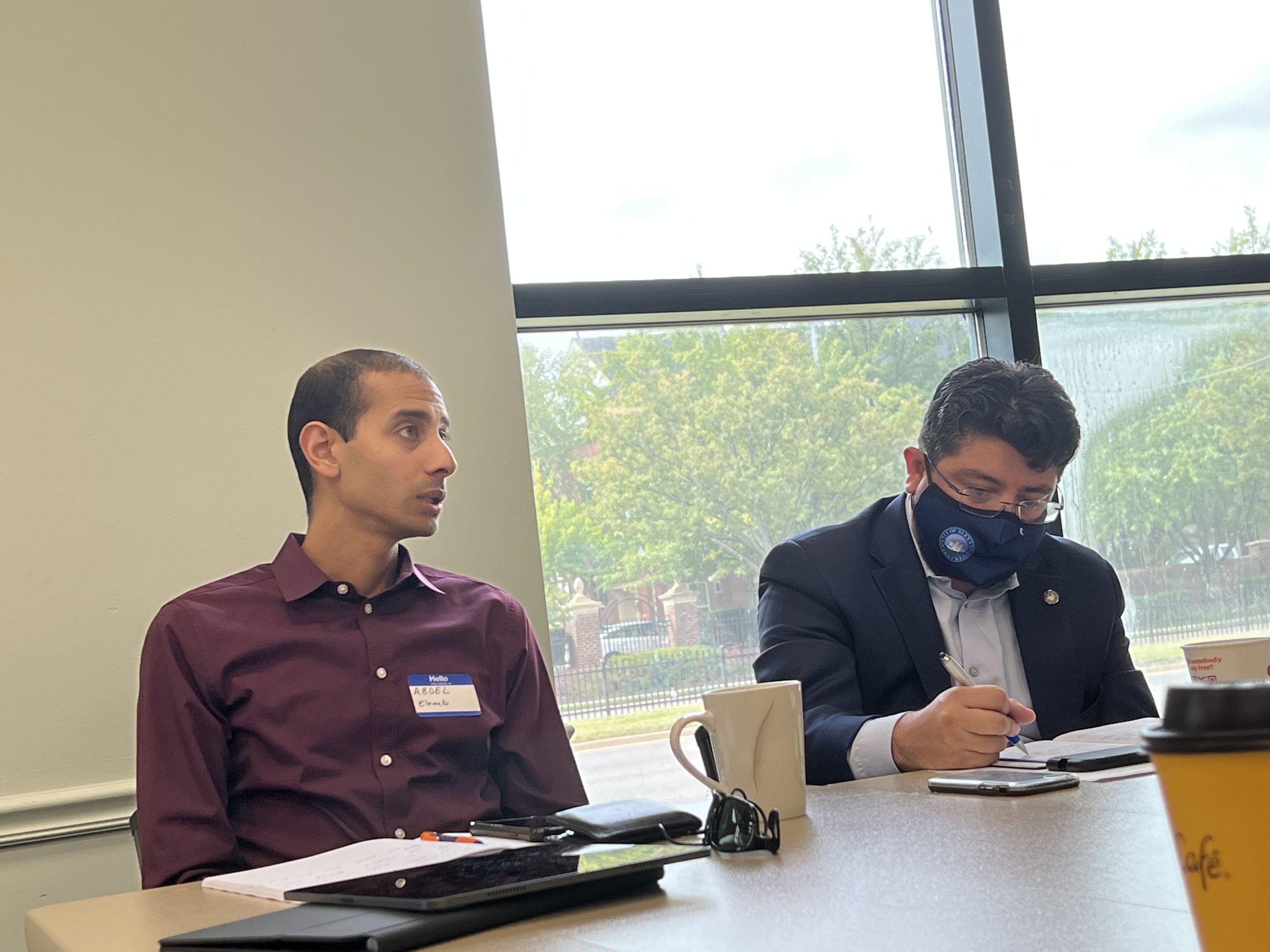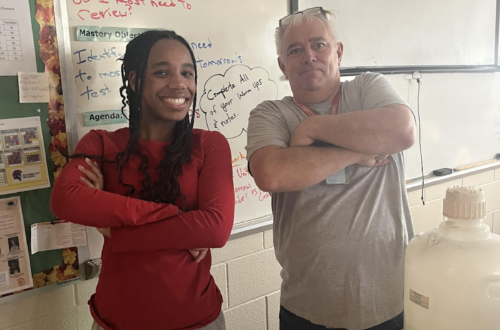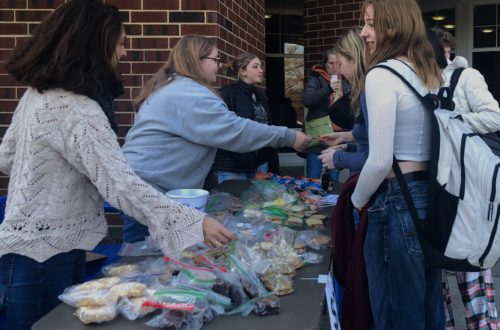Yahney-Marie Sangare
Editor
Alexandria City Councilmember Canek Aguirre and ACPS School Board member Abdel Elnoubi hosted a community listening session about school safety at Beatley Library on Sunday, September 10. The session was permeated with discussions surrounding the Student Law Enforcement Partnership (SLEP) initiative, media response, and community involvement in legislative processes. Elnoubi said that the decision on what to do with school resource officers (SROs) will be made in October or November, whether that be to leave, remove, or reimagine the role of the Memorandum of Understanding (MOU) between the city and schools. This decision will come with the recommendations of the SLEP committee.
The session was attended by around 20 parents, community members, and local leaders. Among attendees were former Vice Mayor Bill Cleveland and Virginia state senator Adam Ebbin.
Elnoubi opened the session with notifications on the recent activities of the School Board. He said that the hiring of the new interim superintendent, Dr. Melanie Kay-Wyatt, was “very involved” and explained that the process to hire the permanent superintendent will have “a lot of opportunity for outlook and feedback [from the community].” He listed policy and work updates from the summer, bringing up the implementation of the student ID verification system, focus on the Talented and Gifted (TAG) program, early college programs, and continued attention to equity processes and student support teams.
Alluding to the removal of Lunch & Learn at ACHS and “schedule changes”, Elnoubi said, “It’s an ongoing discussion; it’s not final. There are going to be iterations and fine-tuning.”
After Elnoubi’s brief, the conversation opened to attendees. The first subject brought up was a fight that occurred the day prior, which Elnoubi stated might be an impetus to evaluate the functionality of staggered dismissal. When asked about the role of SROs in de-escalating a recent incident, Elnoubi clarified that the police that handled the situation were not SROs. The connection to these events lead to conversations of how the SLEP committee was formed in the 2021-2022 school year.
“A parent like me who speaks another language is not included in the selection of the SLEP committee…Because the application and the selection was not [intended] for us,” said a parent at the session.
Aguirre said, “I was very vocal about my discontent with the way SLEP was set up and the way the application process was done; unfortunately, I cannot do anything about that because it is a superintendent group. The School Board voted to make it a superintendent group rather than an advisory group.”
Elnoubi clarified that he voted against making SLEP a superintendent group. He said, “[Some] School Board members got together and came up with a counterproposal…to make a bigger group. If it was up to me, I would’ve made [SLEP] much bigger.”
Mariym Ramos-Salinas, who also distributed a school safety survey alongside Carol James at the beginning of the session, echoed the issue surrounding the composition of the SLEP committee. “If you’re going through the process and do not lay out the representation of your city in the board, then we have a structural problem. We have to have someone from the West-end, the immigrant community, [and] East-end. In this process, they don’t take that under consideration? That’s structural racism.”
Cleveland pushed back against the immediate shift of responsibility surrounding the selection of the SLEP committee. He said, “I spent my time doing what needed to be done. I took [the Parent Leadership Training Institute (PLTI) program] and to be dejected for something like that when we should be speaking up for a parent like that; I think that it’s not right because you have neglected everything these people have put into it.” Cleveland clarified his support for community solidarity, saying, “When we work with the spirit and we work together, we can solve anything.”
Phyllis Lawrence, a member of the SLEP committee, stated that she had seen diversity in the meetings.
Crisis communication was also discussed, especially concerning transparency from ACPS about incidents that occur during school hours. Elnoubi said, “We need to make sure that our communication is clear. If there’s something we can’t say because there are privacy and security issues, we need to be clear about that.” As a father of two who first got involved in community activism with his child’s school, he empathized with the concerns. “I’m a parent myself. If there’s something going on at my kid’s school, I want to know everything…”
Elnoubi went on to clarify that the School Board information strategy is what can be changed legislatively but that public influence and pressure also plays a role. Concerning last Spring, he said, “We did receive an email [from the superintendent] saying don’t talk to the media about [the stabbing]…The problem is that some School Board members feel that if they speak they will be representing the schools… It’s [constituents] job to make sure that… School Board members are held accountable.” Aguirre added that the city will be “revamping” the communications structure.
A variety of other issues were brought up. A 2021 T.C. Williams graduate present at the session recommended having Bradlee Shopping Center stores deny service to students during school hours, which Aguirre supported, saying, “I agree with you 100%. There hasn’t been enough action; I should insert myself and enforce the issue.”
A lack of extracurricular programs, specifically for secondary school students, was linked to inequitable crime rates, especially among disadvantaged populations. Bus transportation routes, especially concerning service to immigrant and minority communities, were also addressed, alongside teacher retention and weapons being brought into school.
The session was dominated by high tensions and frustrations. Former School Board candidate Rico “Coach Rico” Rodriguez summarized the energy: “I’m tired of talking,” he said.
Some also addressed the importance of community solidarity and prevention over separation and punishment. Adrienne Fikes, director of the Parent Leadership Training Institute (PLTI), said, “We do not have the infrastructure in this community to be a community. We have the opportunity to change that…The school spent $500,000 on surveillance instead of preventing the fights.”
Aguirre and Elnoubi both acknowledged community frustrations surrounding perceived lack of input and action. Aguirre validated the discouragement felt by many surrounding disempowerment, especially of disadvantaged communities. “That’s the system doing what it is designed to do,” he said. In spite of this, both continuously advocated for community involvement, discussion, and input to begin to revise those systems.






